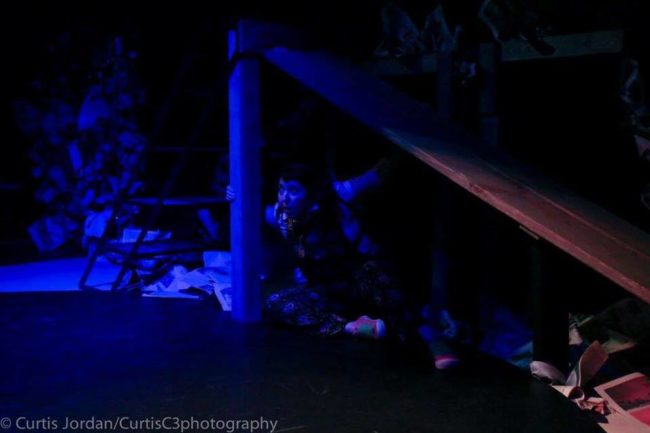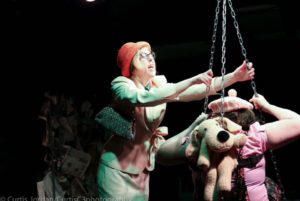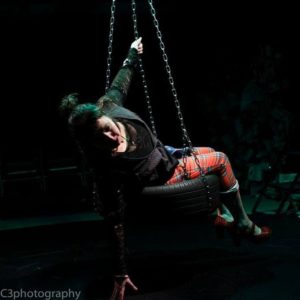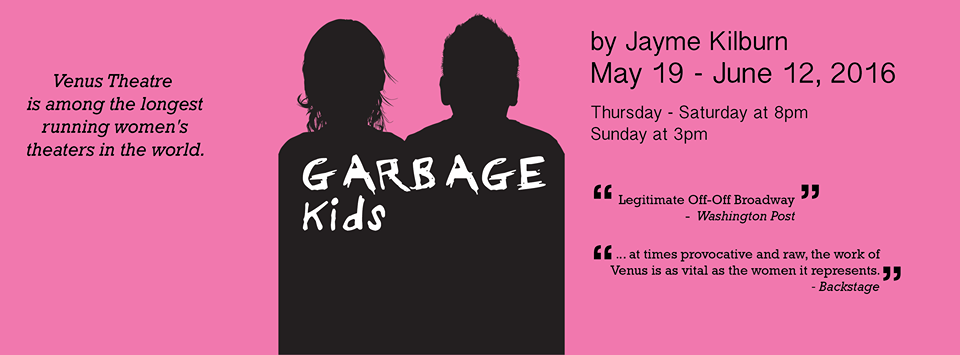Good memories are all too oft entangled with the bad ones, forcing the mind to shut them all out. Recollection is subjective; you aren’t remembering it wrong but rather remembering how you felt it happened. Debuting the 56th women-empowering script at Venus Theatre, Founding Artistic Director Deborah Randall opens the world premiere of Jayme Kilburn’s Garbage Kids and turns the notion of memory on its ear. A play in two acts, where the first is memory and the second occurring in real-time reality, this new work by Kilburn explores what life is like for children who have been discarded by the system like rubbish tossed out to be nothing more than garbage. Directed by Randall, the piece is evocative without being overly dramatic or too heavy and unearths the beauty of Kilburn’s cleverly convoluted construction style when it comes to reality versus memory.

An immersively inviting set has come to be a signature stamp for Venus Theatre productions and Garbage Kids is no exception. Scenic Designer Amy Belschner Rhodes immediately captures the playful yet strikingly dark ambiance of the play’s overall tone with her juxtaposition of literal trash and childhood icons. Strung directly in the center of the set: a giant tire swing, which brings with it fond memories of playgrounds and children enjoying their lives, but Rhodes distorts this pleasant notion with the caged bars stuffed to the brim with garbage which flank the walls on either side of the tennis-court staging. What should be pleasant and cheerful feels vile and gritty, with a plethora of putrid remnants poking out between the bars, encroaching upon the free space of an open air playground.
Rhodes’ scenic artistry is enhanced by the Lighting Design of Kristin Thompson and the Sound Design of Neil McFadden. During the entire first act there are horrifically distorted moments that seem surreally absurd and absurdly surreal; this is a combination of McFadden’s heightened sound effects tangled into the precision timing of Thompson’s lighting displays. When truths unwind in the second act about what exactly was witnessed in the first, these design elements radiate with that much more profundity. McFadden also has the ability to capture the essence of childhood lost in his musical design work of the show’s soundscape. This is heard most effectively at the top of the show with what sounds suspiciously like an electric dulcimer hammer being rained upon and short circuiting in a fanciful rhythm.
Wearing one of four hats, Randall fabricates the costumes for the production in addition to directing it, and the childish couture is the perfect accent to crafting these youthful characters. Both Scuzzy and Belly have very distinctive voices, which Randall has managed to capture divinely in her sartorial selections. Scuzzy, despite being a child of the streets, has a keenly feminine sense about her, reflected in the overalls and later her more gothic plaid look while Belly has bright colors that both compliment and simultaneously clash. Both characters start the production wearing overalls, a sentimental throwback to a youthful time that has passed society by. In addition to crafting the costumes, Randall is also Properties Master for the production and though they are few, the authenticity on things like grilled cheese sandwiches and creepy chicken hats are well worthy of praise.
As the show’s Director, Randall possesses a sharp understanding of the playwright’s intentions, using the framework of the second act to lay the groundwork of the first and working in reverse so that once the play has come to its conclusion, it all fits together like a nicely packaged sandwich with all of the fixings. Randall augments the jagged fragmented reality of the first act by keeping the scenes flickering like blinks of recollection; it is not unlike watching bits of a broken movie through an old projector screen. The second act has a much firmer grounding in reality and Randall shifts her approach to the beat structure and overall character delivery accordingly, the result of which is two curious puzzle pieces coming together to formulate one complete picture.

The supporting character work executed by Amy Belschner Rhodes in the show is sensational. Both the comic characters of Interviewer 1 and Interviewer 2 becomes quite memorable as Rhodes adapts a plucky vocal and physical approach to each of them, especially the latter. Rhodes’ primary role as “woman” is rather striking as well. There is something inherently morose about her overall existence and the brutally torturous power-struggle that strikes up between her and Scuzzy (played by Randall) is remarkable in the sense that it tugs at the heartstrings and revolts in the gut simultaneously. The mutually parasitic symbiosis formed between these two women serves as great intellectual fuel for the brain in addition to showcasing Rhodes’ ability to exist convivially in a story that is somewhat displaced from reality in some moments while tersely grounded in it in others. The moment where Rhodes takes to the slide is pure bliss on multiple levels, showing the importance of simplicity amid the chaos we recognize as life.

Belly (Jay Hardee) is quite the transitory character that fits loosely and tightly into the story’s inner workings. Hardee delivers a thorough transformation from terrified youth to jaded and aloofly depressed and detached adult. Balancing the more humorous moments— like when Hardee takes to leading the ensemble in a rousing rendition of “Hobo Bill” (where Belschner plays base and Randall sings backup)— against the graver ones— like his confession of fear in the middle of the second act— Hardee displays a keen understanding of the character’s many layers. Playing the character consistently at the peak of its emotional height, whether that’s in extreme excitement or darkened depression, Hardee makes for a receptive scene partner opposite Randall, particularly early on when they are both frightened but eager children in the prime of their youth.

Randall, as Scuzzy, is a pistol when it comes to performing as the mouthy young girl. Delivering an endearingly affected bubbled-lisp on the character that gives the impression of street-smarts and prepubescence, Randall delves into the childish nature of the character with vigor. Committing fully to the physicality of the character, which includes a great deal of movement, not the least of which is spinning tirelessly into oblivion round and around on the tire swing, Randall delivers Scuzzy as a force of nature that will not only be recognized but reckoned with. Showcasing immense growth in the character when Scuzzy transitions from a child to a working adult, her interactions with both Hardee and Rhodes drive the play forward with unapologetic enthusiasm.
A fascinating examination of how memory works, how lives can change, how the events from our childhood really do shape our outcome, Garbage Kids is an exhilarating new work well worth examining at Venus Theatre this season.
Running Time: Approximately 95 minutes with one intermission
Garbage Kids plays through June 12, 2016 at Venus Theatre— 21 C. Street in historic Laurel, MD. For tickets call the box office at (202) 236-4078 or purchase them online.

